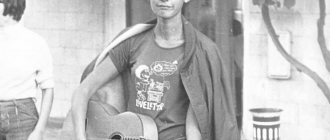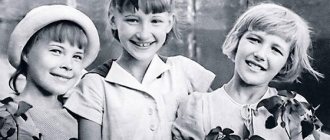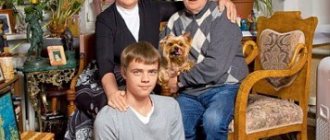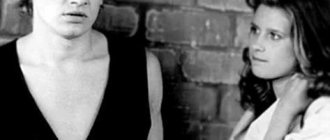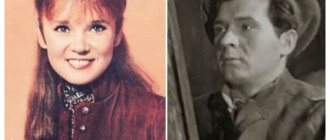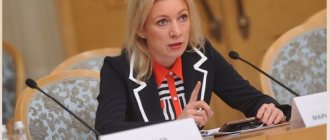Despite the fact that Svetlana Bezrodnaya celebrated her 85th birthday, she is still energetic and doing what she loves. Together with her team, the conductor visited the best concert venues in the world, but she often refused to tour abroad and dedicated her work to her compatriots. Svetlana Borisovna considers it her duty to support people living in hot spots; musicians of the Vivaldi Orchestra not only give concerts, but also bring humanitarian aid to those in need.
She received the love and attention of the general public thanks to her brainchild, which appeared in her creative biography 30 years ago. During this time, the team began to work in several directions; musicians included Russian songs, dance music of the 50s of the last century, jazz and even rock and roll in their repertoire.
Bezrodnaya did not immediately find her female happiness; Having gone through humiliation and pain, she became strong and wise, and only then began to prove that she was also a person and, moreover, talented. Only after 50 years did the People's Artist of Russia improve her personal life and meet true love. There is absolute harmony between her and her husband, and they even think in the same direction.
Childhood and youth
Svetlana Borisovna Bezrodnaya (Levina) was born on February 12, 1934 in Barvikha, Moscow region. She grew up in an intelligent Soviet family.
Father, Boris Solomonovich Levin, was part of a council of 15 doctors who monitored the health of Joseph Stalin and the party leadership.
Posted by Elena Volkova on Thursday, February 12, 2015
Svetlana Bezrodnaya in her youth
During the period of repression, the man was exiled to the Irkutsk region. He survived thanks to a thief in law who ordered prisoners to treat the doctor with respect. He was rehabilitated after the death of the Secretary General. Despite this, he retained reverence for Stalin. But the wife and daughter, having temporarily lost their breadwinner, were starving. And if they met acquaintances on the street, they crossed to the other side of the street and looked away in shame.
Boris Solomonovich himself, after rehabilitation, refused to return to the Kremlin, created an institute of balneology, and ran a sanatorium in Dorokhovo.
Mother, Irina Mikhailovna Shepshelevich-Lobovskaya, singer. She had a dramatic mezzo-soprano voice and performed the role of Lisa in The Queen of Spades. During the Great Patriotic War, she lost her voice after learning about the execution of her loved ones by the Nazi invaders.
Svetlana studied at the Central Music School, then at the Moscow Conservatory, after which she became a soloist of the Mosconcert.
The parents' position allowed them to be friends with the children of commanders Ivan Konev and Vasily Chuikov; the family visited the house of Nikita Sergeevich Khrushchev.
But the girl did not feel chosen at all. On the contrary, she was withdrawn, which can be seen even in childhood photographs.
People around believed that the Levins lived in a mansion with antiques and luxurious furniture, but in fact the family huddled in a communal apartment. Svetlana learned to play the piano from her neighbors, because the instrument did not fit at home.
About father
— How did you react to the death of Stalin?
— It all happened on March 5, the same day as Sergei Prokofiev’s departure. There is something mystical about this, isn’t it? Especially when you remember the difficult fate of the film “Ivan the Terrible” with the brilliant music of Sergei Sergeevich...
The great composer was buried so quietly that no one noticed.
As for Stalin, in our house they didn’t curse him, but they didn’t cry or die from grief either.
Dad was pulled out of the Gulag on the orders of Khrushchev and Malenkov. Mom often talked with Nina Petrovna, Nikita Sergeevich’s wife, and she said that her husband personally gave the command to find doctor Levin. Dad was valued in the Kremlin; he was a great specialist.
Dad could easily have died in the camp. The chief prisoner saved him from probable death... what do they call them correctly?.. by those watching?
— Godfathers, probably.
- Maybe. I don’t know, I don’t speak criminal vocabulary. In a word, a man named Ibrahim, seeing his father who arrived in Taishet, essentially naked and barefoot, said: “Don’t touch the doctor, provide everything he needs.” And dad was given a padded jacket with felt boots, he was able to spend the winter in the Siberian taiga. I am ready today to bow at the feet of Ibrahim if I meet him in the next world...
Dad returned home unexpectedly. The doorbell rang and I opened it. Father stood on the landing in worn-out soldier's boots and a long, worn overcoat. He stood and smiled at me with his toothless mouth. But dad was a little old. He was born in 1901. But the time spent in the camp left its mark.
— Did Boris Solomonovich tell you about the zone?
- Never! He didn't like talking about himself at all. Although he was not an office doctor, he flew to the partisans behind the front line and suffered frostbite on his feet during the war. He didn’t complain, much less try to seem like a hero. He lived modestly and worked honestly. At the same time, the talent was incredible!
After returning from the camp, he was offered to be reinstated as the head physician of Lechsanupr. Dad refused. Flatly. Instead, he essentially created the Institute of Balneology from scratch, becoming its founder. Another brainchild is a sanatorium in Dorokhovo.
Once I was invited to give a concert at the 4th Main Directorate of the Ministry of Health, the former Medical Directorate of the Kremlin. I came to the building on Granovsky Street, now Romanov Lane, saw a portrait of my father in the reception area, apologized and left. I couldn’t be there, I thought: “Since dad didn’t come back to you, I won’t play.”
— Is it true that there was a moment when you didn’t want to pick up the violin?
— After the conservatory, I didn’t touch the instrument for a long time. Fifteen years, if not more. This is due to certain circumstances of my personal life, I don’t want to dredge up the past now. In short, I didn’t find support for my endeavors in my family and closed myself off, deciding that I would never play on stage. I even donated a violin; it was the work of Nicolo Galliano from the funds of the State Collection of Unique Musical Instruments. I only kept the bow for myself. I always act categorically: when you leave, leave.
By the way, I still play the Galliano violin now, but differently. At one time there was Amati, but I’m used to larger instruments, although the master is certainly a genius, the first of a galaxy of great Italians - Stradivari, Guarneri, Testore...
Music
Svetlana Borisovna’s musical biography began with teaching at the Central Music School, where she trained many laureates of prestigious competitions.
In 1989, Bezrodnaya created the State Chamber Vivaldi Orchestra of the USSR Ministry of Culture, in which she was not only the artistic director and chief conductor, but also performed as a soloist. The composition included only women, eighteen graduates of the Moscow Conservatory originally from Central Asia. The orchestra was named so because 300 years ago Antonio Vivaldi organized the same one from the nuns of a Venetian monastery.
The first concert of the group took place on May 5, 1989 on the stage of the Column Hall of the House of Unions. And in September the girls already performed in Germany, at the Hamburg festival in St. Nicholas Cathedral. They performed “The Seasons” and “String Serenade” by Pyotr Ilyich Tchaikovsky. Bezrodnaya stood with her back to the audience so that during the concert she could see the orchestra and the crucifixion of Christ on the wall. Only later did she learn that more than five thousand people had gathered in the hall.
Then there was a big tour of the cities of the USSR, from Kaliningrad to Vladivostok. Bezrodnaya also had to visit Taishet, where her father was imprisoned.
“Vivaldi Orchestra” by S. Bezrodnaya – Hall of Columns
Posted by Dance Theater “Rendezvous” on Monday, July 10, 2017
Svetlana Bezrodnaya and the Vivaldi Orchestra
The ensemble is still touring, its repertoire includes classics, jazz, and pop works. A special place is occupied by the music of Johann Sebastian Bach, Wolfgang Amadeus Mozart, and Dmitry Shostakovich. The discography includes 22 albums.
In February 2015, the group took part in an anniversary concert dedicated to the 100th anniversary of the birth of People's Artist of the USSR Vladimir Zeldin.
Svetlana Borisovna called the creation of a same-sex orchestra a crazy idea that hit her head in a situation of complete loneliness. By that time, the woman had not picked up a violin for 20 years.
Since 2015, she has become a member of the jury of the Blue Bird competition. Young artists from Russia and neighboring countries demonstrate their musical, choreographic, and vocal talents. The program several times became the leader of Sunday broadcasts, gaining the maximum audience. In 2020, another season of the children's talent show was released.
In addition to Bezrodnaya, the performances of the participants were assessed by the Bolshoi Theater premier Nikolai Tsiskaridze and the performer of Russian romances Oleg Pogudin. Svetlana Borisovna noted that the project is unique; this has never happened on television in any country in the world. Filming took a long time, 10–15 hours a day. It happened that the contestants performed at three in the morning.
Personal life
Svetlana Borisovna's first husband was Igor Semenovich Bezrodny, violinist, People's Artist of the RSFSR. The man received the Stalin Prize in his youth, at the same time as Mstislav Rostropovich. With him, Bezrodnaya felt like she was behind a stone wall; her husband protected her from all problems.
Son Sergei became a pianist and soloist of the Moscow Virtuosi group. The boy was born when Svetlana Borisovna took exams at the Central Music School.
Posted by Ministry of Culture of the DPR on Thursday, November 23, 2017
Svetlana Bezrodnaya and Rostislav Cherny
A new turn in Bezrodnaya’s personal life occurred in 1968, when she married conductor Vladimir Spivakov. The violinist simply allowed herself to be taken away from her first family, which she could not forgive herself for a long time.
Vladimir Teodorovich turned out to be the complete opposite of his ex-husband. He was self-centered and demanded to do only what he needed. But he helped Sergei in his professional career; they still collaborate fruitfully and have recorded many discs together. In addition, the conductor had the same cheerful character as his wife, and could dance all night to the music of Johann Strauss.
The third husband, Rostislav Borisovich Cherny, worked in journalism. The violinist met him at Isaac Stern’s performance in 1990. She was sitting in the twelfth row with a swollen leg, and the lady was irritated by everything. The man sat behind and during the intermission asked mutual friends to introduce him. The marriage turned out to be happy.
Long road to happiness
The artist’s first family appeared while she was still studying at music school. Her future husband, violinist Igor Bezrodny, was her teacher. A whirlwind romance arose between them, and soon the 16-year-old girl found out that she was pregnant. One evening, the musician took the student to his home, and then called her mother and said that she would not come home, as she would soon get married. As a tenth-grader, Svetlana first gave birth to her son Sergei, and then took school exams. The lovers went to the registry office only after she passed her first exam.
Svetlana Bezrodnaya now
On October 27, 2021, the Vivaldi Orchestra concert “Don’t Talk About Love...” took place at the Moscow State Academic Philharmonic. The program included lyrical melodies from the repertoire of Klavdia Shulzhenko, Leonid Utesov, Mark Bernes, Maya Kristalinskaya.
Posted by Lyudmila Makarova on Monday, November 26, 2018
Svetlana Bezrodnaya on the jury of the Blue Bird talent competition
On November 5, 2021, the Vivaldi Orchestra took part in the literary and musical performance “Cold Passions, Strange Love,” presented in the Great Hall of the Moscow Conservatory. The creators of the production defined its genre as a parable, where the destinies of three great creative personalities are intertwined - William Shakespeare, Mikhail Lermontov and composer Nino Rota.



